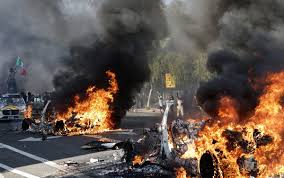Exiting a Business – Options
- This discussion explores options for exiting a business, including selling, merging, succession, or closure, helping owners share experiences, lessons, and practical strategies for smooth transitions.

You must be logged in to rate.
Introduction: The World at a Tipping Point
From the Pope’s recent appeal to tear down walls, to the erupting riots in Los Angeles, the world is sending out distress signals. These moments, though seemingly isolated, are threads in a broader tapestry of unrest. They reflect decades of inequality, systemic failures, poor political leadership, and a gaping void where a cohesive global vision should be. We are witnessing the consequences of decades of imbalance—economic, social, political, and environmental—manifest in a multitude of crises. It is not a sudden collapse, but a slow unravelling, a cumulative result of decisions made and ignored across generations.
This article explores the state of the world today, connecting the dots between global inequality, political dysfunction, mass displacement, and the erosion of trust in institutions. More importantly, it offers a path forward that includes all of humanity, not just the privileged few who have long held the reins of power.
Part I: The World We Built—And Let Decay
Much of what we see today is rooted in historical inequality. Colonial exploitation, racial hierarchies, patriarchal systems, and resource plundering created wealth for a few at the expense of many. Despite declarations of progress, millions still live without basic rights—clean water, healthcare, education, and political voice.
Global economic systems reinforce this inequality. The top 1% of the world’s population controls nearly half of the wealth, while over 700 million people live on less than $2 a day. This disparity is not just an economic fact; it’s a structural crime.
We live in an era of performative leadership. Politics has been reduced to a reality show—Left vs. Right, populists vs. technocrats. Leaders focus on short-term optics over long-term vision, and voters are manipulated through fear and misinformation.
Instead of unifying messages, we see divisive rhetoric. Nationalism is on the rise, fuelled by economic anxiety and cultural paranoia. But walls—physical and ideological—do not solve global problems. They exacerbate them.
The unrest in Los Angeles is not new, nor isolated. From Chile to Lebanon, France to Nigeria, mass protests have erupted across continents. These are not spontaneous combustions; they are the result of accumulated frustration.
When systems no longer serve the people, people revolt. It’s cause and effect.
War, climate change, and economic collapse have displaced millions. Refugees are treated as burdens rather than victims of failed policies and global indifference. Countries ravaged by conflict—Syria, Yemen, Ukraine—are left to rebuild amid sanctions, exploitation, and debt traps.
Yet, the international community—led by the UN and elite forums like Davos—issues statements while real solutions remain elusive.
Part II: The Systems We Trust Are Failing Us
The United Nations was born out of hope, yet today, it often functions more as a symbolic body than an effective global manager. Veto power politics, bureaucracy, and the absence of enforcement mechanisms hinder progress.
The same nations that speak of peace sell arms to warring factions. The same powers that claim to support human rights turn a blind eye when profit or politics is involved.
The annual World Economic Forum at Davos is a theatre of irony. Billionaires, politicians, and celebrities gather to discuss global inequality while flying in on private jets. Solutions that emerge often benefit corporations more than communities.
The global economy has been gamed to favour the powerful. Tax havens, deregulation, and monopolies ensure that wealth stays in the hands of a few.
Developing nations are crushed under debt burdens created by exploitative loans and conditional aid. These financial chains limit sovereign growth, forcing governments to prioritise repayments over public services. The IMF and World Bank, while occasionally helpful, are often complicit in perpetuating economic dependence.
Part III: The Cost of Division and Distraction
While ideological diversity is healthy, the polarisation of politics into tribal factions has paralysed democratic processes. Debates become battles; opponents become enemies. Nuance is lost in the noise.
This binary thinking—us vs. them—is outdated and dangerous. Humanity’s challenges are not left-wing or right-wing; they are existential.
Corporate media often serves the interests of those in power, shaping narratives that protect the status quo. Sensationalism overshadows substance, and truth becomes relative. This erosion of trust fuels conspiracy theories and social fragmentation.
Part IV: The Path Forward—A Global Renaissance
We need a new global compact. One that is democratic, inclusive, and enforceable. Global problems—climate change, pandemics, migration, economic justice—require global solutions. A reformed UN, equipped with real power and accountability, could be the foundation.
We must transition from extractive capitalism to regenerative economies. Wealth redistribution is not radical; it is necessary. Universal basic income, debt cancellation, fair taxation, and green investments can rebalance the scales.
Multinational corporations must be held accountable for their global impact. Economic justice must become the norm, not the exception.
A global education initiative should be launched, prioritising critical thinking, civic responsibility, and empathy. An informed and engaged population is the antidote to tyranny and manipulation.
This education should be accessible to all, regardless of nationality, class, or creed.
Technological advancements must serve human well-being. AI, biotechnology, and automation should not widen gaps but close them. Ethical frameworks, open-source innovation, and public ownership of tech infrastructure are key.
The Pope’s message is timely: break down the walls that divide. Faith leaders, artists, storytellers, and philosophers must join scientists and policymakers in imagining a future grounded in unity, dignity, and compassion.
Culture shapes consciousness. Let it be a force for healing, not harm.
Let us propose a radical idea: a Global People’s Assembly, composed of citizens from every nation, to serve as an advisory and oversight body to the UN and world governments. This would restore faith in democracy and bring moral clarity to global governance.
The Time is Now
We stand at a crossroads. The world as it exists is not sustainable. We face ecological collapse, democratic decay, economic injustice, and spiritual crisis. But these challenges also present an opportunity: to build something new, inclusive, and lasting.
It begins with honesty. With acknowledging the failures. With listening to the unheard. With demanding more from our leaders—and ourselves.
The state of the nations is precarious. But it is not hopeless.
Let us not watch the world burn in apathy or laughter. Let us act with courage, with conviction, and with care. This is not just about saving the world. It’s about reclaiming our shared humanity.

Get Involved
Posted by a proud member of Ideas-Shared. Verified and aligned with our values of transparency and collective impact.
This listing speaks about a key issue that may affect millions — perhaps even you. Here we don’t just post content. We mobilise around it. So if this listing resonates with you, here’s what to do next...
Participation means collaboration, structure, action, and ambition realisation. Ready to help?
| Cookie | Duration | Description |
|---|---|---|
| cookielawinfo-checkbox-analytics | 11 months | This cookie is set by GDPR Cookie Consent plugin. The cookie is used to store the user consent for the cookies in the category "Analytics". |
| cookielawinfo-checkbox-functional | 11 months | The cookie is set by GDPR cookie consent to record the user consent for the cookies in the category "Functional". |
| cookielawinfo-checkbox-necessary | 11 months | This cookie is set by GDPR Cookie Consent plugin. The cookies is used to store the user consent for the cookies in the category "Necessary". |
| cookielawinfo-checkbox-others | 11 months | This cookie is set by GDPR Cookie Consent plugin. The cookie is used to store the user consent for the cookies in the category "Other. |
| cookielawinfo-checkbox-performance | 11 months | This cookie is set by GDPR Cookie Consent plugin. The cookie is used to store the user consent for the cookies in the category "Performance". |
| viewed_cookie_policy | 11 months | The cookie is set by the GDPR Cookie Consent plugin and is used to store whether or not user has consented to the use of cookies. It does not store any personal data. |
There was a problem reporting this post.
Please confirm you want to block this member.
You will no longer be able to:
Please note: This action will also remove this member from your connections and send a report to the site admin. Please allow a few minutes for this process to complete.